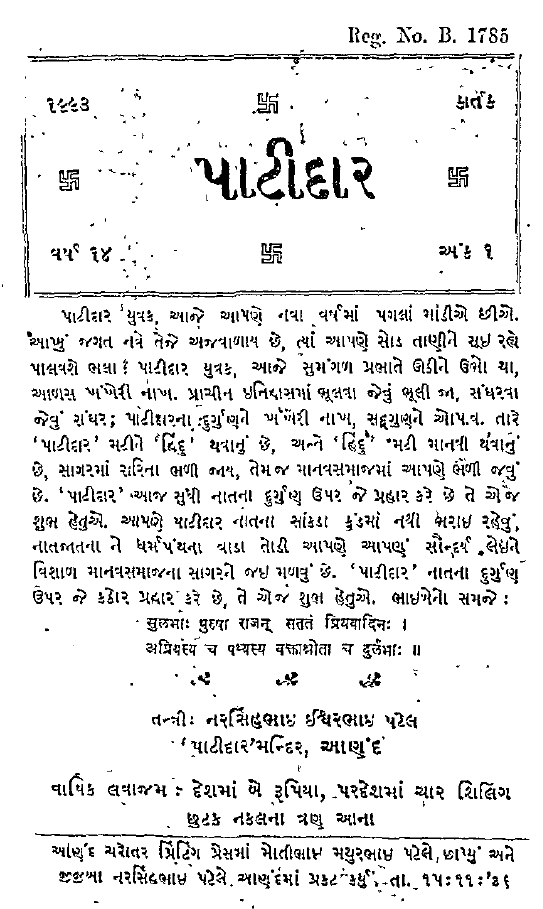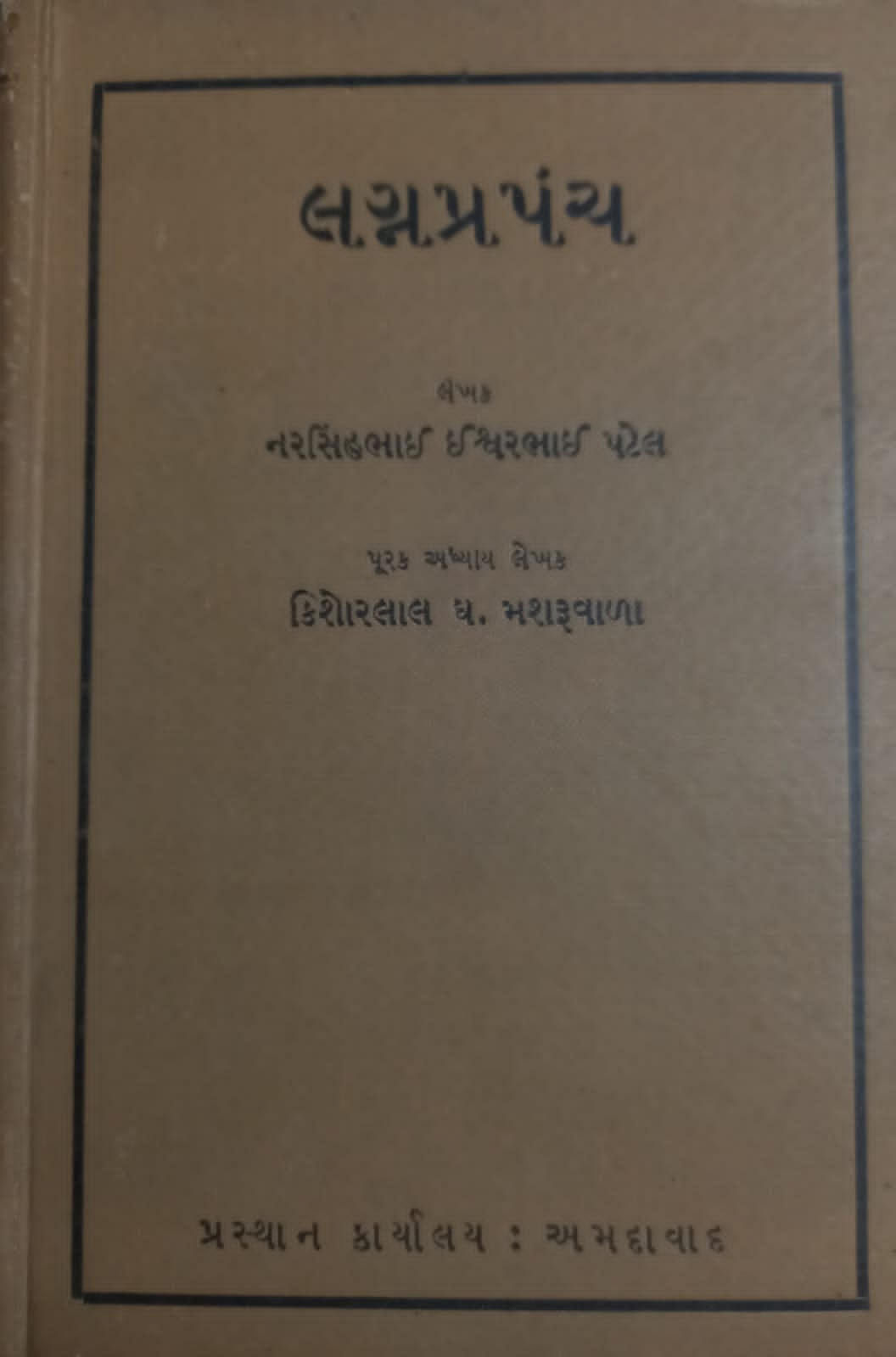AnnThe life of Arsinghbhai Patel is a fascinating account of a social reformer ahead of his time, an early advocate of women’s rights and a staunch atheist who has a groundbreaking Gujarati book on atheism to his name. The Criminal Investigation Department of the then Bombay Presidency considered him the most dangerous person in the stubborn Patidar community.
Patel started out as a revolutionary and a follower of the Bombay sect of Bengal. The Indian philosopher Aurobindo Ghosh and his more radical brother Barindra Kumar Ghosh were inspirations for him during his college days at the Maharaja Sayajirao University of Baroda. After graduation, Patel took a job as a school teacher in Baroda State. He was posted at Mehsana in Gujarat, where he started a printing press and published a monthly paper Teacher (Teacher).
He also wrote, translated and compiled books in Gujarati on European revolutionaries such as James A. Garfield, Giuseppe Garibaldi and Giuseppe Mazzini. His most infamous book was a DIY guide on bomb making, aptly named herbal medicine (herbal medicines). This was a translation by Barindra Ghosh the way to salvation (Which path of salvation). Because of Patel’s publications, he had to bear the wrath of the British Government.
Read also: Remembering revolutionary martyr Udham Singh who avenged Jallianwala Bagh
revolutionary at heart
The British banned the book on bomb making and started harassing Patel. In 1912 he was imprisoned for some time. The Gaekwad state also exiled Patel for five years and imposed a fine of Rs 300. Patel moved to Pondicherry, a French colony at the time, but the British followed and pressured his employer there. Patel went to Africa to escape the heat.
He went to Mombasa in East Africa and lived for a long time in Mwanza, a German colony. He learned German there. His wife and two daughters stayed with him in Africa. After the British occupied Mwanza in World War I, Patel moved his base to Jinja in present-day Uganda. The stay in Africa provided ample time and opportunity for Patel to read and think. going through leo tolstoy a murderer’s remorse There was a drastic change in his views and made him a practitioner of non-violence. He came in contact with CF Andrews who was a Christian missionary and friend of MK Gandhi and Rabindranath Tagore. He suggested Patel to join the Santiniketan ashram after his return to India.
Following the advice of Andrews, Patel went to Santiniketan and taught German there. He stayed with his family and veterans of Shantiniketan for about three years (1920–1923). A revolutionary at heart, Patel never shied away from speaking his mind to anyone – not even Tagore or Gandhi, whom he greatly respected. He encountered Tagore during an informal night gathering when Tagore was praising the Japanese and their artistic spirit. “Who enslaved Korea and oppressed the Korean people?” Patel asked a clear question. When Tagore tried to present the Japanese side, saying that they were popular among Koreans, Patel replied, “By that standard, Nero playing his fiddle from his rooftop while Rome was burning should also be popular.” Unlike some of his disciples, Tagore took Patel’s comments seriously and commended him for speaking his mind.
After leaving Santiniketan, Patel settled in Anand, a city in the Charotar region of central Gujarat, later known as the milk capital of India. It was near his native village Sojitra. Disturbed by the social evils of his community, Patel started a monthly named Patidar In 1924. The magazine aspired to reform bad practices within the caste group, to lead fellow Patidars to break caste-creed shackles. His writing style was direct, stern and fearless.

He took an active part in India’s independence movement, welcomed Gandhi in Anand during the famous Dandi March and served a prison sentence. But when Gandhi scolded his wife Kasturba for going to the Jagannath temple in Puri, where Dalits were not allowed, Patel wrote Patidar It is not for Gandhi to decide what his wife should do and where she should go. He remarked that even a Mahatma like Gandhi was not completely free from the age-old practices of patriarchy.
Read also: Batukeshwar Dutt as Bhagat Singh, India’s forgotten revolutionary in the shadow of Rajguru
deny god
his book with the sharp title Lagnaprapancha (Marriage Fraud) In 1937 she was recognized as the best advocate for women. This 650-page preface was written by Gandhiji’s close associate and thinker Kishorlal Mashruwala. Patel’s main argument in the book was that the institution of marriage was created to suffocate and crush women. his 1932 book God’s denial (denying God) was equally radical. The seeds of atheism were sown in Patel’s mind long back. Born in a family of Swaminarayan followers, Patel was influenced by some of the principles of the Arya Samaj. But he could not accept that the Vedas came directly from God.

Although his home in Anand was named Patidar Mandir, Patel attracted a readership—especially the youth— God’s denial Reading, thinking and driving away religions. He did not hesitate to say that even if he was the only person who believed in his ideas, he would not hesitate to declare what he found to be true. Gandhi read some of Patel’s books with particular interest during his imprisonment. Africana Petro (Letters from Africa), and praised their frankness and frankness.
The death of his wife Diwaliben and an attack of paralysis left Patel’s body broken but his spirit intact. When former Prime Minister Morarji Desai asked him in the last phase of his life if he would eventually believe in God, he said no. His daughters Shantaben and Vimlaben were active in carrying on his legacy during his imprisonment and illness. they took over the reins Patidar And proved to be worthy daughters of a distinguished father. His son Ramanbhai was in Africa from a young age, but Ramanbhai’s son Shantibhai joined his grandfather and participated in the independence movement.
Narsinghbhai Patel did not live to see the country get freedom. But he was the perfect example of what a citizen of a free, democratic country should be like.
Urvish Kothari is a senior columnist and writer based in Ahmedabad. Thoughts are personal. This article is part of an ongoing series, Gujarat Giants.
(Edited by Ratan Priya)